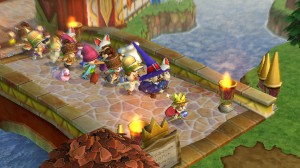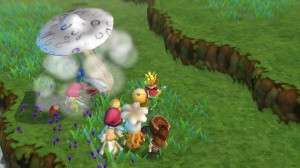What do YOU think? Satire + Games = Sat…ames? Satigames?
Note from Austin: Many apologies for missing last week’s article, but hopefully a more in depth piece will be worth the wait! Since this week’s article is a little more obscure than previous ones, I encourage you to read it thoroughly and get a firm grasp on the idea for your responses. Additionally, be sure to read the question!
The idea of satire is that a piece of work, be it a game, a movie, or a book, takes a stance on a social subject, like racism or politics, and makes fun of it. This is something that is very prominent in movies and books, but games have barely dabbled into this realm of work. Traditionally, the works in which satirical material can be found, regardless of the specific type of outlet, are usually limited to pieces that are aimed at a more mature, adult-focused demographic. Compositions like Joseph Heller’s Catch-22 or Goichi Suda’s No More Heroes are prime examples of this general trend in satirical work, but every so often a piece will be written, developed or filmed that will break the mold and surprise its entire audience.
The most recent example of this is the collective work of Yasuhiro Wada, Yoshiro Kimura and Youichi Kawaguchi who came together to create Little King’s Story, a simulation role-playing game where players take on the role of Corobo, a timid boy who has found a mysterious crown which gives him the power to “charm” people and make them follow his every will. While the premise sounds more like the plot of a children’s story book than an in-depth satirical video game, nothing could be further from the truth. In its 40 hours of play, Little King’s Story presents a derision of religion, the doomsday scenario, the nature of war, polygamy, imperialism, human laziness, and above all else, class division using cleverly placed plot-points, running dialogue, and gameplay elements.
The overarching theme of Little King’s Story is one of social structure and class division, and this is evident, before players even begin to take control of Corobo, by a cutscene. During it, small finger puppets dance in front of a colorful background, illustrating a narration which is voiced over the cinematic by a small boy. It states “I am more noble than you, and he is more noble than me. The rich are more noble than the poor, and those who work hard are more noble than the lazy. Then who is the more noble of them all?” With this simple line of dialogue, the entire tone for the game is set, and it carries fluidly over to the rest of the experience.
After the opening completes itself, players assume the role of a small king inside a small castle in the middle of a small town with a small number of citizens in the small kingdom of Alpoko, where Corobo is introduced to Howser, Verde, and Liam, his three assistants. The most important of these is Howser, whose name is an allusion to Nintendo’s own mega-villain,”Bowser”. This name could be considered an act of foreshadowing, but more importantly, Howser is the epitome imperialism throughout Little King’s Story. Before even introducing himself and his character, Howser’s motive is clear: He wants to take over the world, and he assures King Corobo that it will spread happiness to everyone in the kingdom if he does so. Being a small child, Corobo willingly obeys Howser and their quest for world domination begins.
When players are introduced to their kingdom and finally have the freedom to walk around in it, one thing becomes clear: Nobody works. The citizens, rather than being referred to as “Citizens” are called “Carefree adults”, and this persona only solidifies itself as the game goes on. Whenever Corobo speaks to one of these citizens, they will say one of two types of things. The first and more important of those is a slew of remarks regarding their lack of desire to work. “I don’t want to be poor, but I don’t want to work either.” is one of the more straightforward sayings, while “I hang around at home on Sundays. It’s so nice. By the way, every day is sunday for me!” or “I thought about getting a job… Then I came to my senses!” represent a group of more obviously comedic commentaries regarding human laziness. The other sort of remarks made by the carefree adults fall under the category of class structure and the mindlessness of citizens under monarchial rule. “I love this kingdom! It deserves 100 points out of 100!” and “Living here is like living in a paradise!” are a few of the phrases that are spoken, regardless of the clear lack of systemic lifestyle and general income in the kingdom.
Another thing illustrated by the carefree adults early on is the misogynistic nature of lazy men. Stereotypically, men are lazy, think of women as cooks or houseworkers, or any number of other generalizations, and these conventional images of them are seen clearly through the eyes of the carefree adults, once again implanted in the dialogue. In one instance, a man’s wife goes missing, to which he says “I hope she didn’t die… Who’d do my laundry?”. This sexist nature is shown later on in the game as well, when Corobo begins to train grunt soldiers.
A juxtaposition of carefree adults and “grunt soldiers” is clear in talking to the King’s newly found military branch when King Corobo receives just a bit of funding to kick start his kingdom. The first thing he is forced to build is an armory to train soldiers and begin to spread happiness throughout the world. These soldiers will follow the king around, and attack anything he designates without question. While the carefree adults offer little more than useless complaints and mindless compliments, the soldiers are a little more thoughtful and serve as a clear collocate against them. When one of them offers his thoughts on marriage, he says “I’m looking for someone to share my sorrow and joy with.”. Compared to the carefree adults, who are simply looking for someone to do the laundry, these soldiers have a deeper level of thinking, at least when it comes to relationships.
Other than being used as a juxtaposition against laziness, these grunt soldiers, like Howser, are a physical manifestation of imperialism. The vast majority of statements they make are similar to things like “As a grunt soldier, I think we should increase military spending and expand the kingdom by force!”, and even go as far as to condone global imperialism by saying “Global Imperialism, for the win!”. Additionally, the only people that allow themselves to be brought into battle (with the exception of Corobo) are the grunt soldiers; Try and recruit Howser or any of the other higher-ups in the kingdom, and they’ll offer an excuse such as age, business, or importance of current work. This, coupled with Howser, makes the theme of global imperialism prevalent even within the first 15 minutes of the game.
The radicalness of religion and over-credited image of God is another theme that makes itself known within the first 15 or so minutes. While walking around the village inspecting houses and building businesses, Corobo comes in contact with Kampbell, a religious turkey from the “Sect of Soup” (an obvious allusion to Campbell’s Soup) that tells Corobo he must build a church or face the wrath of God. Each time he speaks thereafter, Kampbell instructs Corobo to do another task by the will of God. “God says you must kill all the UMA that get in your way.” is an example of this, and a commentary on the violence that can be caused by over-zealous religious radicals. Later on in the game after Corobo and his troops defeat a ghostly cow that was haunting Alpoko, Kampbell gives all the credit to God for the hard work of the men and women that truly defeated the monster.
After the initial tutorials and character introductions are over, even more themes become prevalent, and previously mentioned topics are revisited with a stronger, more obvious satirical presence. After Corobo’s village is completed and all the buildings are raised, his quest to build a strong kingdom has come to a close, and the people of Alpoko are happy. Soon after, the castle receives a letter from the mysterious “Onii King” in a language that is undecipherable. Nevertheless, Howser takes the paper and looks over it for a minute, thereafter announcing what it says. “It seems that the Onii King has sent a letter of challenge to you all! He calls the your kingdom Aljerko and calls you a world class jerk!” This letter, which came supposedly out of no where, is an obvious commentary on the nature of war and how immature and poorly thought out it is. Within seconds after reading the letter, Howser declares that the Onii King and his kingdom must be silenced, and once again Alpoko is at war.
Another satirization of the over-credibility given to God comes at this point in the game, when Corobo and his troops finally make it to the entrance of the Onii-King’s throne room. On the door, they find a letter taped to the door titled “Memo from God”. The paper is crumpled, written in poor handwriting, and features instructions on how to defeat the Onii-King in battle, supposedly (but obviously not) given to you by God. After reading it and filing it away, Corobo proceeds into the throne room, confronts, and defeats the Onii-King, after which a celebration is held to congratulate the hard work of the King. Everyone is in attendance, and applause is all around for the King from everyone except for Kampbell, who declares it “Veni Vidi Vici” day, and, though he says he realizes that Corobo and his troops did all of the work, he only has thanks for God.
With each successive kingdom Corobo conquers, more and more satires poor in, with one of the most prominent being a continued commentary on polygamy and the mistreatment of women. After defeating the Onii-King, a princess frees herself from the clutches of evil and immediately forces herself upon Corobo, becoming his queen and wife in holy matrimony. The entire kingdom shows up for the ceremony and congratulates him, bringing wedding gifts and cards, no doubt. It is a fine ceremony and without a doubt something to be celebrated, but as soon as Corobo defeats the next kingdom, a princess once again forces him to marry her, and once again the entire kingdom shows up with congratulations and comments on how wonderful and beautiful marriage really is. This repeats itself 7 times, each one ending with congratulations and gifts galore, no one paying any mind to the fact that he continues to marry princesses that are not only from completely different kingdoms, but have nothing at all in common. Truly, Corobo is marrying purely for the sake of marrying, not taking into account anything other than the fact that he is king and will have it the way he likes.
The imperialistic, almost Nazi-like side of the game is shown yet again when, after the defeat of the Onii-King, Howser brings 2 letters to the king and reads them aloud. Both are from the ruler of another kingdom in the world, which is an outrage to Howser, who warns Corobo that these rulers are merely impostors and that he is the true king of the world. Naturally, it is his duty to eliminate these impostors and claim what is rightfully his, regardless of the fact that he is the newest and youngest king to enter the world of Alpoko. This is almost a reflection of manifest destiny and the issues surrounding the Native Americans in the 19th century, or perhaps a more recent allusion to the rise of the Third Reich and Hitler’s campaign across Europe.
The real brilliance behind Little King’s Story is the use of a child as the main character. After Corobo defeats the Onii King and gains control of his land, Howser congratulates him for bringing happiness to the people of Alpoko but assures him that he must take over the rest of the world and defeat anyone that gets in his way. Watching a small child innocently slaughter kingdom after kingdom, take on princess after princess, and defeat leader after leader until world domination is complete provides a very powerful juxtaposition that displays war in an almost disgusting fashion that can corrupt even the seemingly innocent world of Little King’s Story.
Even when compared to some of the most highly regarded satirical products, the childish, cartoony Little King’s Story doesn’t fall flat in terms of quantity and quality of mockery present. The use of a fictional fairy-tale world as a juxtaposition against the nature of war and corrupt empirical society brings the satire down to a simpler and more understandable level which increases its effectiveness and adds a more comprehensible sense of scope to the issue. Additionally, it has shown that a piece of work need not be mature to be effective in delivering a powerful commentary to a wide range of people, which is perhaps the real purpose of the product.
Like I said, this week’s article is a bit more difficult to get a solid question out of, so let me be a little clearer. The idea for your responses is to share your thoughts on games as satire, or games as a way of social commentary, much in the game way that books and movies are used. Are games sophisticated enough to achieve this level of thought? Will games ever be as useful as novels or film in getting a satirical point across? What about games as art?
Good luck, and I’ll see you all again next week!



